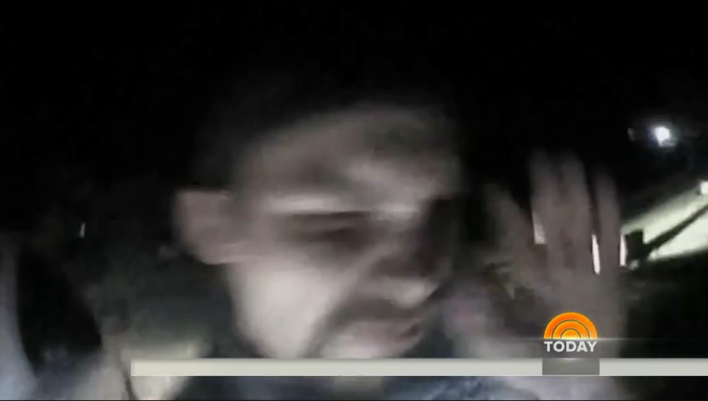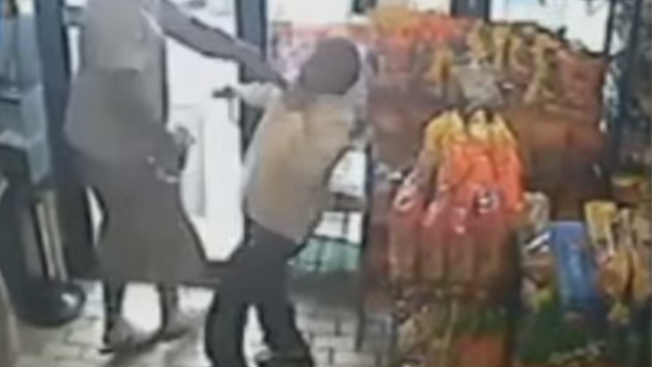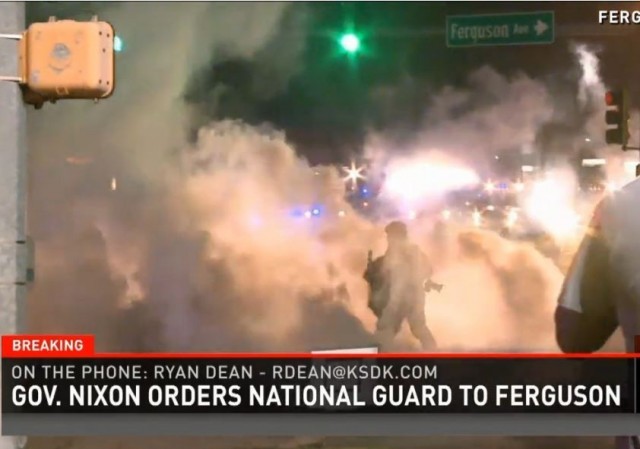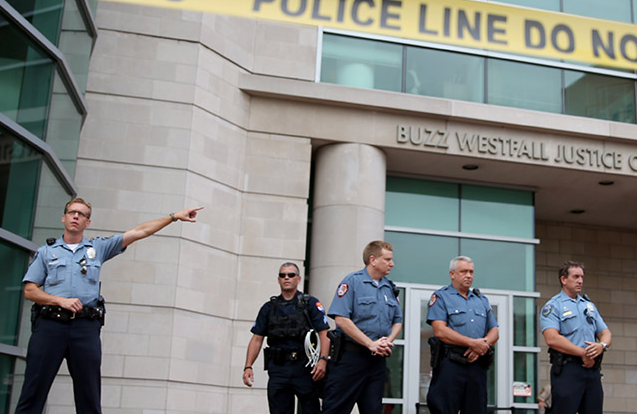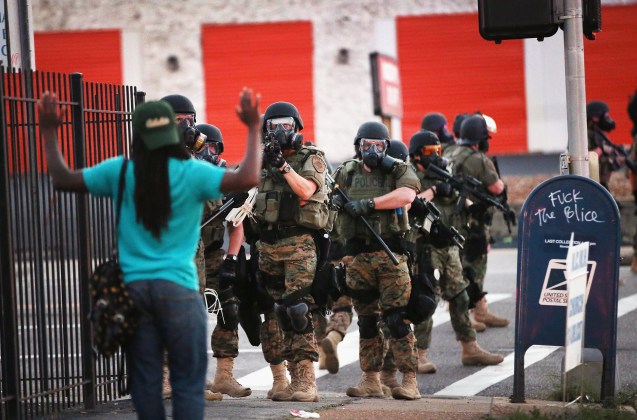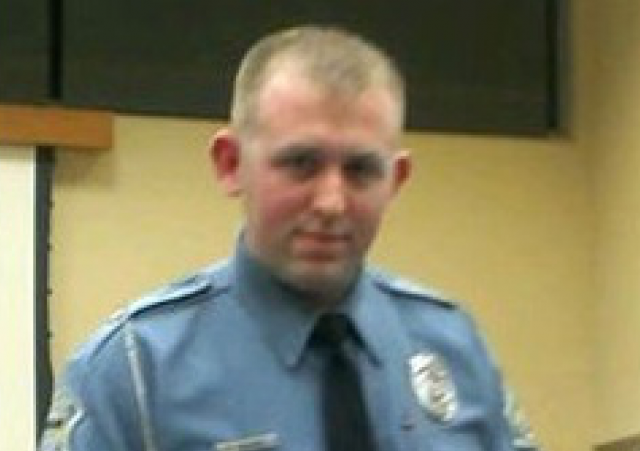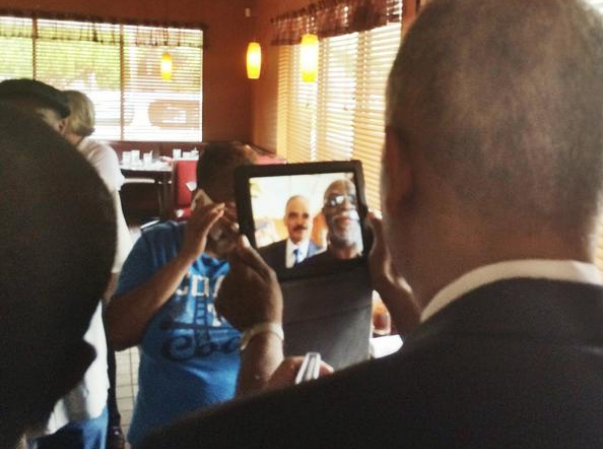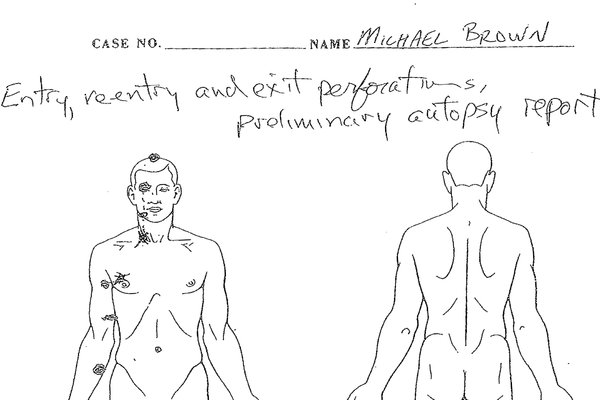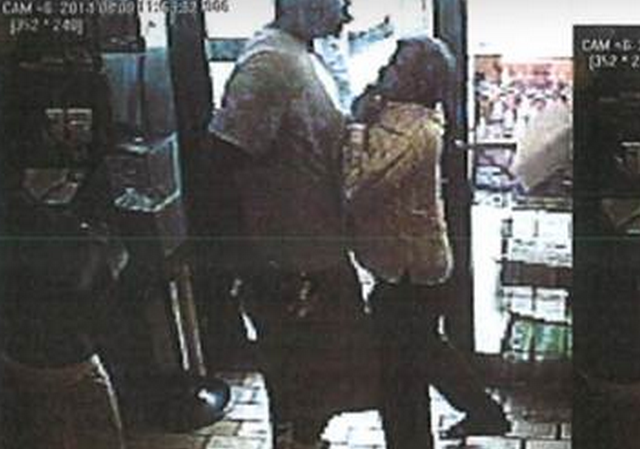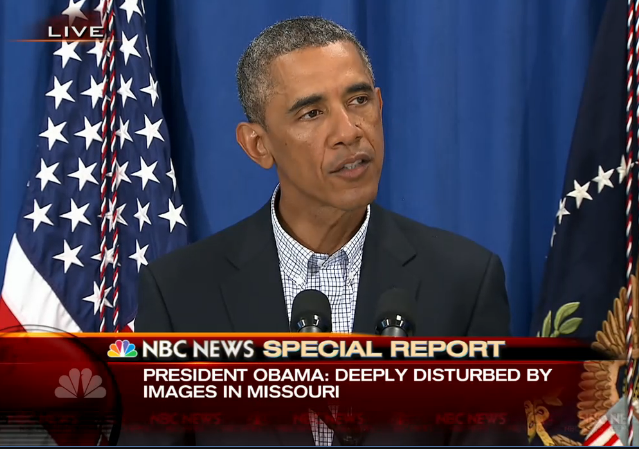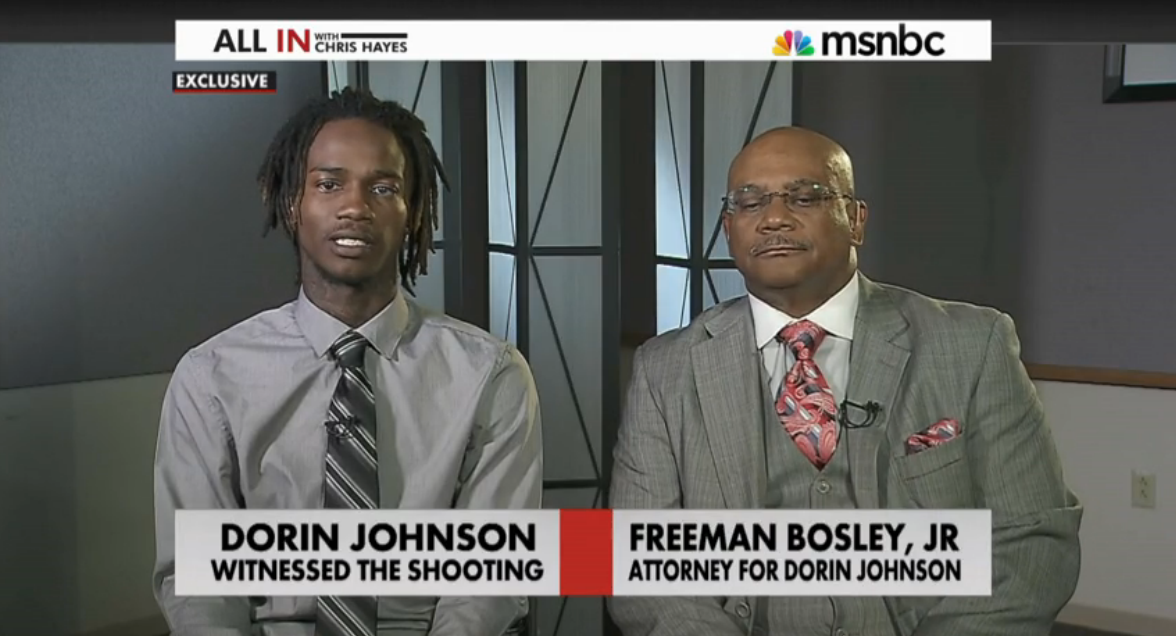Ferguson Tag
When can you legally use a gun against an unarmed person?
Deadly Force: Force Likely to Cause Death or Grave Bodily Harm
Protesters Sue City of Ferguson
Five protesters are suing the city of Ferguson and St. Louis County, Missouri, as well as their police chiefs, based on allegations that they were subject to excessive force and false arrest, among other things. ... Two plaintiffs, a woman and her son, 17, claim that they were wrongfully arrested for failure to disperse at a Ferguson McDonald’s restaurant, which they visited after attending an AME Church “Peace and Love rally.” Another plaintiff arrested for failure to disperse stated that after riding the bus to visit his mother, police shot him with rubber bullets as he attempted to avoid a blocked street. ... Justin Cosma, a Ferguson police officer, is also named as defendant in the case.Specifically, the Ferguson protesters are suing for false arrest, negligent supervision (of the police departments by the City of Ferguson and St. Louis,) intentional infliction of emotional distress, assault and battery, and two separate civil rights claims under 42 U.S.C. § 1983: deprivation of civil rights, and failure of the police department to train, supervise, and discipline its officers. The suit seeks over $40 million in damages, and plaintiffs' attorneys say that new defendants may be added at any time. This won't be the first time that police officers in Ferguson have come under fire after alleged civil rights violations. Several officers associated with the department have a history of trouble with allegations of excessive force.
Police wife: If husband defends himself he’s damned, if doesn’t he’s dead
Police wife on #Ferguson: "This could have easily been us in this situation"...
Competing media narratives of Darren Wilson and Michael Brown
...[E]veryone leaves a record, and Darren Dean Wilson is no exception. People who know him describe him as someone who grew up in a home marked by multiple divorces and tangles with the law... Wilson has had some recent personal turmoil: Last year, he petitioned the court seeking a divorce from his wife... His parents divorced in 1989, when he was 2 or 3 years old... In 2001, when Wilson was a freshman in high school, his mother pleaded guilty to forgery and stealing. She was sentenced to five years in prison, although records suggest the court agreed to let her serve her sentence on probation.
Did MO Law Allow for Deadly-Force Arrest of Mike Brown?
MRS §563.046: Law enforcement officer's use of force in making an arrest
In this context much has been made in the press by "journalists" who have stumbled across Missouri Revised Statute §563.046 is entitled "Law enforcement officer's use of force in making an arrest." It provides, in relevant part, that:3. A law enforcement officer in effecting an arrest or in preventing an escape from custody is justified in using deadly force only (emphasis added)
. . .
(2) When he reasonably believes that such use of deadly force is immediately necessary to effect the arrest and also reasonably believes that the person to be arrested
(a) Has committed or attempted to commit a felony (emphasis added); or
(b) Is attempting to escape by use of a deadly weapon; or
(c) May otherwise endanger life or inflict serious physical injury unless arrested without delay.
Washington Post finds Darren Wilson guilty by association
 Here's an excerpt on that prior police department from Darren Wilson’s first job was on a troubled police force disbanded by authorities:
Here's an excerpt on that prior police department from Darren Wilson’s first job was on a troubled police force disbanded by authorities:
The small city of Jennings, Mo., had a police department so troubled, and with so much tension between white officers and black residents, that the city council finally decided to disband it. Everyone in the Jennings police department was fired. New officers were brought in to create a credible department from scratch. That was three years ago. One of the officers who worked in that department, and lost his job along with everyone else, was a young man named Darren Wilson. Some of the Jennings officers reapplied for their jobs, but Wilson got a job in the police department in the nearby city of Ferguson.....
Thankfully, the presumption of innocence applies even in Ferguson
We may never know what actually happened during the violent encounter between teenager Michael Brown and policeman Darren Wilson. But legal judgments rarely happen with perfect knowledge and absolute certainty. In their place, we rely on presumptions and standards that guide our thinking and discipline our judgments. In general, we presume innocence. But when we know that a killing has occurred and can definitively identify who committed the act, traditional common law demanded that our presumptions shift. We are supposed to presume guilt, and it is the shooter who must prove that his actions were justified. Unless the shooter is a policeman. And unless the victim is a black male. And unless the shooting happens in a state with self-defense laws like Missouri.So, let's take a look, shall we?
In general, we presume innocence.Indeed, in criminal prosecutions we presume innocence. This is entirely consistent with the liberal tradition that it is “Better that 10 guilty killers go free than one person who killed in proper self-defense go to prison for a long time (or be executed)," to quote Eugene Volokh's column linked in the embedded quote above. Certainly, it is possible to imagine a criminal justice system in which one is presumed guilty. I expect that most people--particularly those who are the victims of systematic social injustice--would find such a system not to their liking. We'll get back to that later.
#Ferguson Updates – Is the worst over?
As tensions on the streets here seemed to ease on Thursday, Gov. Jay Nixon ordered the Missouri National Guard to begin withdrawing from the city. “I greatly appreciate the men and women of the Missouri National Guard for successfully carrying out the specific, limited mission of protecting the Unified Command Center so that law enforcement officers could focus on the important work of increasing communication within the community, restoring trust, and protecting the people and property of Ferguson,” Mr. Nixon said in a statement. He said that order in the city had been largely restored and that the presence of the National Guard was no longer needed.Is the Trayvon case really the prototype to use? Well, maybe, if you want a prototype of a rush to judgment based on inflammatory racial accusations that had no basis in evidence: Even WaPo now is reporting on the alleged eye socket fracture to the police officer:
Reports: Ferguson Police Officer Darren Wilson was beaten by Michael Brown
Darren Wilson, the Ferguson, Mo., police officer whose fatal shooting of Michael Brown touched off more than a week of demonstrations, suffered severe facial injuries, including an orbital (eye socket) fracture, and was nearly beaten unconscious by Brown moments before firing his gun, a source close to the department's top brass told FoxNews.com. “The Assistant (Police) Chief took him to the hospital, his face all swollen on one side,” said the insider. “He was beaten very severely.”... The source also said the dashboard and body cameras, which might have recorded crucial evidence, had been ordered by Ferguson Police Chief Thomas Jackson, but had only recently arrived and had not yet been deployed.Too bad about those cameras; what poor timing. The article also says that St. Louis County police, now in charge of the investigation, have refused to confirm or deny the story. They say they will present all the evidence to a grand jury when the time comes.
Holder Goes to Ferguson, makes matters (a) better, or (b) worse?
Justice Department officials say the unusually aggressive federal intervention is justified by the continuing violence and apparent mishandling of the case by local officials, who have been criticized for displaying excessive force against protesters and moving too slowly to investigate the Aug. 9 shooting. But law enforcement officials and other experts could not recall another instance in which Washington pushed ahead with a federal civil rights case as it has in Ferguson, almost elbowing state officials out of the way.Fortunately for America, Holder also took time out of his busy schedule to get in on a selfie:
A man takes a selfie with Attorney General Eric Holder #Ferguson pic.twitter.com/SI8jScJfJ2
— Ryan J. Reilly (@ryanjreilly) August 20, 2014In a sign that Holder's campaign is gaining traction in the area, a group of African American lawyers held a news conference Tuesday in front of the St. Louis County courthouse, calling on local prosecutor Robert McCulloch to recuse himself. They said the federal investigation should proceed first because McCulloch appears to be "emotionally invested in protecting law enforcement." Yet with all of Holder's determination, the reality is that state prosecutions almost always go first and that a federal civil rights case could be harder to build and win than a state case involving a charge of murder or manslaughter.
Misleading Initial Narrative of Zimmerman-Martin Case Applied in Ferguson
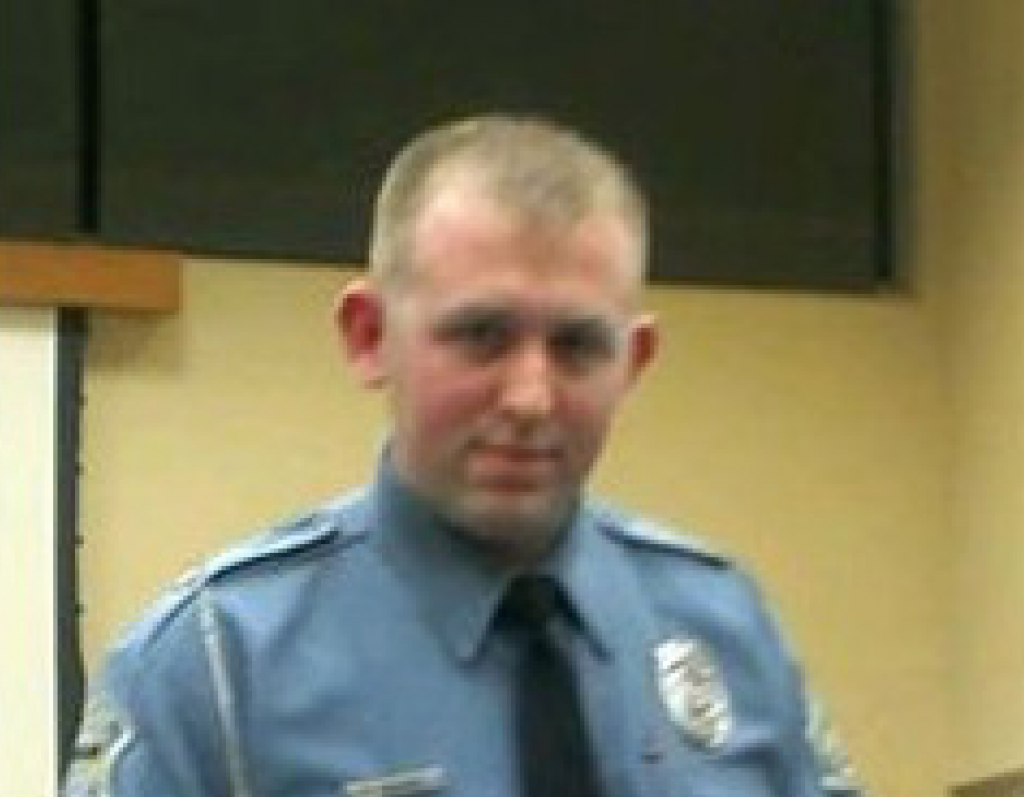 Ferguson Police Officer Darren Wilson[/caption]
Ferguson Police Officer Darren Wilson[/caption]
A Too-Familiar Misinformation Cascade
This most recent high-profile shooting has also seen the deployment of a too-familiar misinformation cascade in cases where there is a real or perceived racial element. This misinformation cascade achieves its purpose by taking what few “facts” are typically available in the immediate aftermath of such an event, and passing them through a rhetorical filter to construct two defining narrative elements:The pure victim: An image of the victim as an innocent, nearly saint-like, young child of such tender years as to suggest that the very notion of him committing an act of malice is preposterous.
The monstrous aggressor: An image of the shooter as an angry, hateful, racist monster with a hunger for shooting young black children dead in circumstances totally absent of legal justification.
The Misinformation Cascade in the Zimmerman/Trayvon Case
In the case of the shooting of Trayvon Martin by the "White Hispanic" George Zimmerman, these dual goals were accomplished in several ways.Eyewitness testimony often unreliable, as Michael Brown case already shows
The weapon focus effect suggests that the presence of a weapon narrows a person's attention, thus affects eyewitness memory. A person focuses on the central detail (for example, the weapon) and loses focus on the peripheral details (for example, the perpetrator's characteristics). While the weapon is remembered clearly, the memories of the other details of the scene suffer...Another hypothesis is that seeing a weapon might cause an aroused state. In an aroused state, people focus on central details instead of peripheral ones.That's not the only focus problem. There's more:
#Ferguson – Latest Developments Open Thread
Michael Brown, the unarmed black teenager who was killed by a police officer, sparking protests around the nation, was shot at least six times, including twice in the head, a preliminary private autopsy performed on Sunday found. One of the bullets entered the top of Mr. Brown’s skull, suggesting his head was bent forward when it struck him and caused a fatal injury, according to Dr. Michael M. Baden, the former chief medical examiner for the City of New York, who flew to Missouri on Sunday at the family’s request to conduct the separate autopsy. It was likely the last of bullets to hit him, he said. Mr. Brown, 18, was also shot four times in the right arm, he said, adding that all the bullets were fired into his front.Chaos, violence in Ferguson; National Guard called in:
HuffPo reporter mistakes foam earplugs in Ferguson, MO, for rubber bullets
It happens to all of us. Well, maybe not all of us....
UPDATED: Brown Was a Robbery Suspect, Cop Identified in #Ferguson
#Ferguson: Obama says stop the looting and police excessive force
Dorin Johnson's Attorney
Yesterday I mentioned that the St. Louis Police who are handling the Ferguson cluster, have not yet interviewed Dorin Johnson, who claims he was with Michael Brown when Brown was gunned down by law enforcement Saturday. Johnson appeared on MSNBC in an interview with Chris Hayes, accompanied by his lawyer, Freeman Bosley, Jr. Bosley is an interesting character himself. The former St. Louis mayer seems to have a checkered past, with "ethics violations" being a reoccurring theme. Last year, Bosley sent fundraising letters soliciting donations to cover his daughter's college tuition. The St. Louis Post-Dispatch reported, "Bosley said his daughter worked hard to finish in the top two percent of her graduating class at St. Elizabeth Academy. He said she deserves to go to a private school." When the odd fundraising request was brought to light, Bosley vowed to return any donations received. Earlier this year, the board governing Missouri lawyers moved to suspend Bosley's law license for two years. The list is a pretty great read. Misuse of client funds and malpractice make appearances more than once.St. Louis Police Department Hacked by Anonymous
Originally, the St. Louis Police Department planned to release the name of the law enforcement officer who shot and killed Brown. As violence escalated, SLPD opted not to release the identity of the officer in order to protect him. So Anonymous, the infamous hacking conglom got involved and called for a "Day of Rage," because that's helpful. According to CNN, Anonymous has the name of the officer, but CNN refused to announce the officer's name on air.Should The Public be Privy to the Officer's Name?
Kevin Williamson at National Review has an interesting take on this question:#Ferguson Missouri, Domestic War Zone
Donations tax deductible
to the full extent allowed by law.
CONTRIBUTORS
- William A. Jacobson
Founder
- Kemberlee Kaye
Sr. Contrib Editor
- Mary Chastain
Contrib Editor
- Mike LaChance
Higher Ed
- Leslie Eastman
Author
- Vijeta Uniyal
Author
- Stacey Matthews
Author
- Jane Coleman
Author
- Ben Smith
Weekend Editor
- Elizabeth Stauffer
Author
- Mandy Nagy
Editor Emerita
- Learn more about the Contributors


